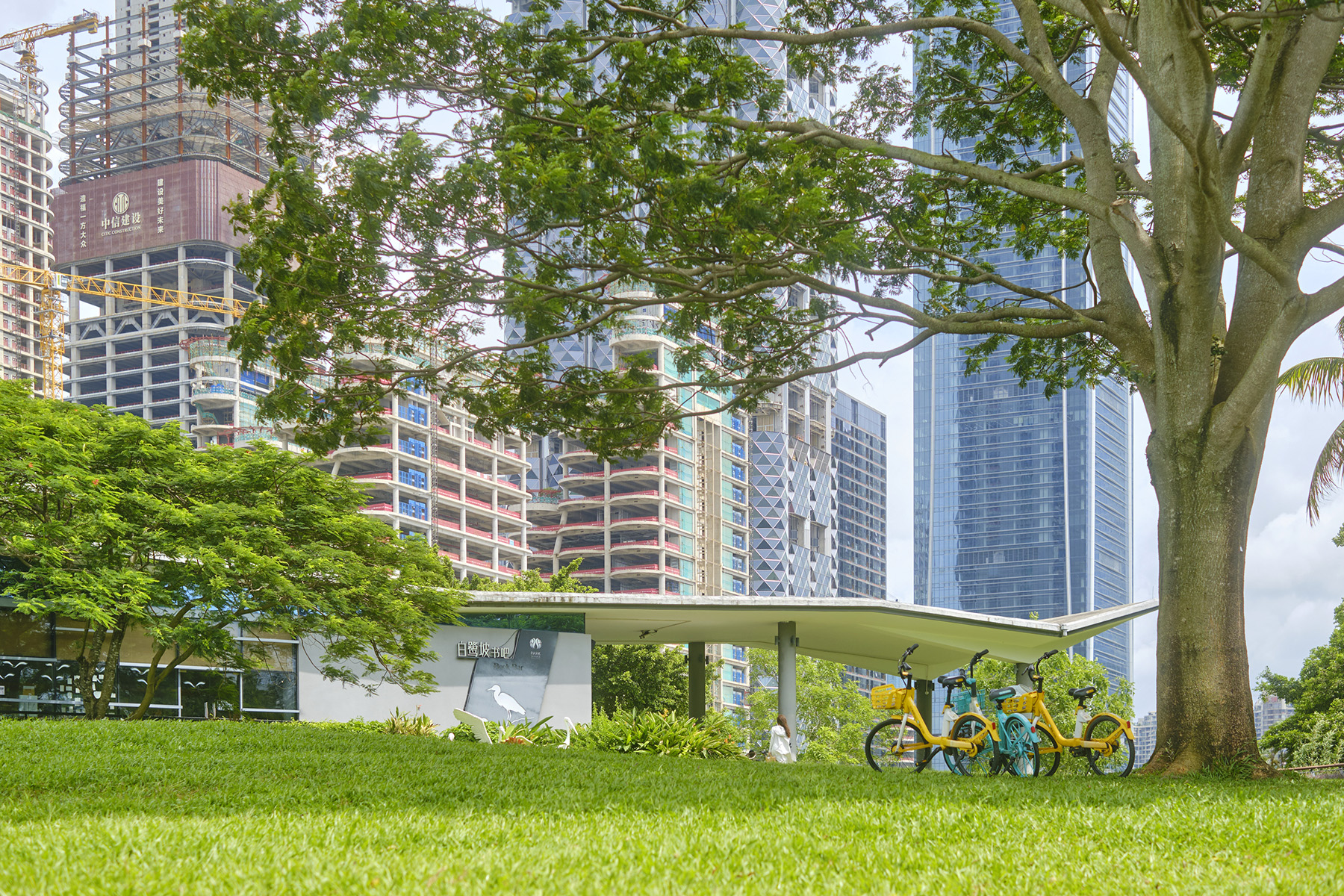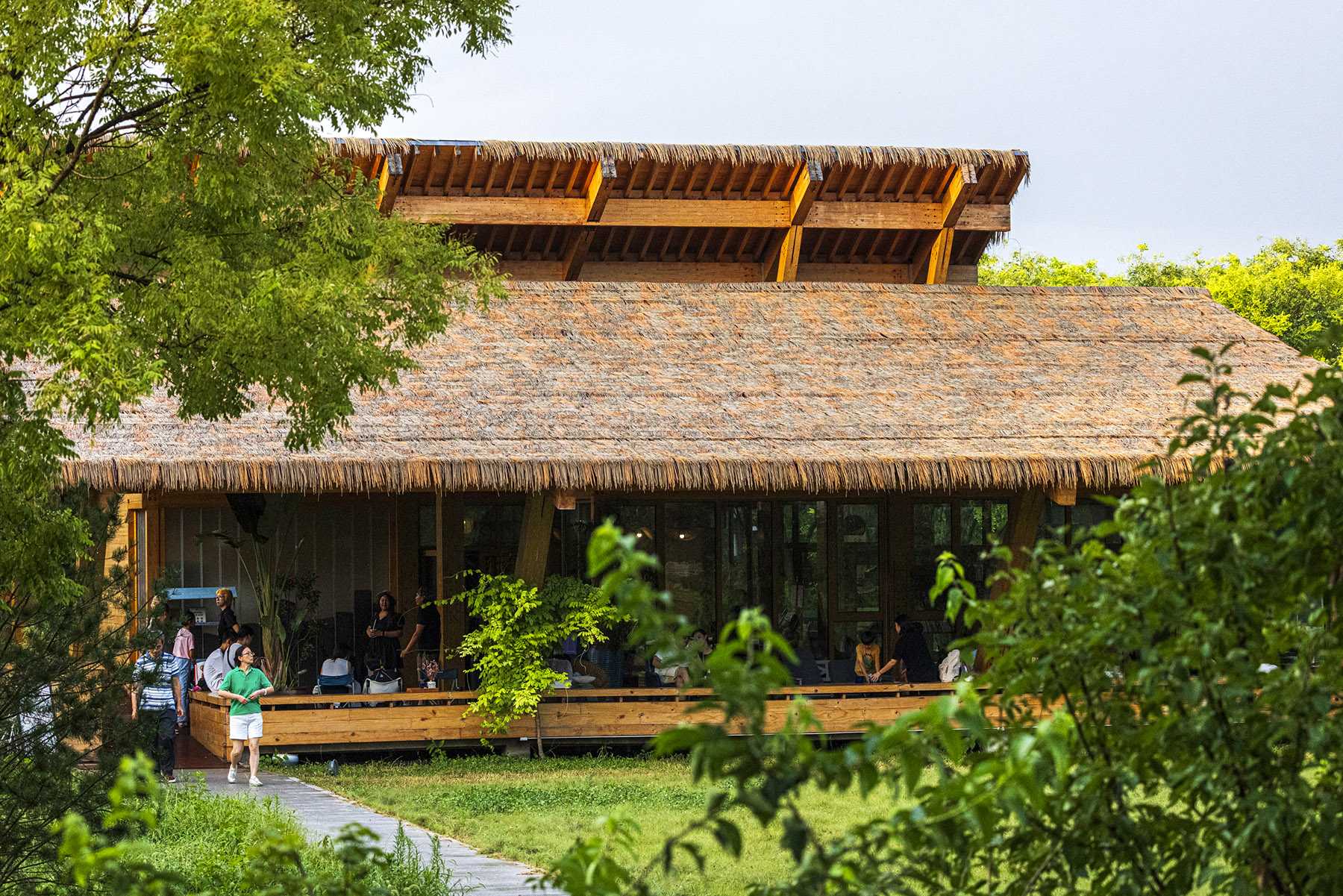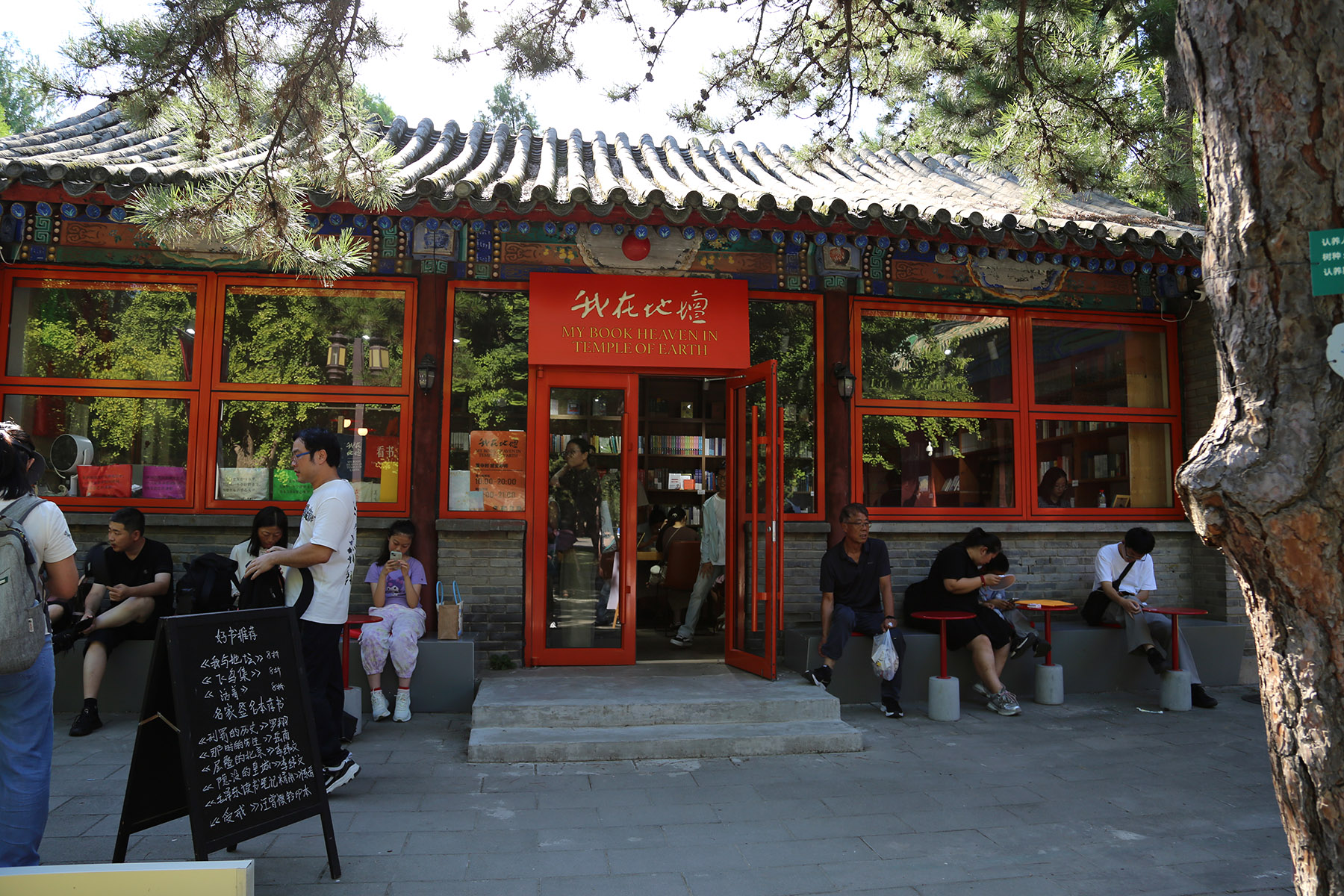Bookshops' woodland settings a selling point among growing number of fans

During a visit to a park in southern Beijing, Shi Yifan happened to find a bookstore nestled within woodland. Since then, the 30-year-old has come to read every couple of weeks.
Nanyuanshe, the bookstore in Nanyuan Forest Wetland Park in the capital's Fengtai district, is hidden among the lush greenery of locust trees. The wooden building is wrapped in floor-to-ceiling glass and sparrows often gather on the dry grass nearby.
On a sunny day and inside the bookstore, sunlight spills over books, creating a peaceful and enchanting setting for reading.
"On my day off, I usually visit the park to take a walk and relax with a book. I love this bookstore because it's surrounded by nature. The beautiful scenery fills me with energy and vitality and contrasts with bookstores in enclosed commercial areas. Being close to nature helps me find peace while reading," Shi said.
READ MORE: Bookstore weaves a new village story
But there is a constant flow of visitors in the bookstore, she admitted. However, this brings a sense of movement, with people constantly coming and going, which she finds quite pleasant.
"I don't mind the noise because when I'm here reading, I can also observe the lively interactions around me such as parents playing with their children, couples enjoying each other's company, and friends taking photos or soaking up the sunlight. It all feels vibrant and full of life," she said.
In recent years, parks across major cities in China have transformed from areas for morning exercises and flower admiring into hubs of cultural and social activity. The aroma of coffee and books, and the lively atmosphere of human interaction have created a new consumer landscape.
In Beijing, numerous parks have enthusiastically adopted this trend, creating vibrant, multifunctional spaces. For example, Beijisi Park features an innovative area that seamlessly integrates a bookstore, cafe, and restaurant, offering visitors a unique blend of relaxation, culture, and dining in one location.
According to the space manager, the average customer stay at the bookstore is five times longer than at typical bookstores in shopping malls, Beijing Youth Daily reported in August.
Similarly, in Wuhan, Hubei province, visitors can enjoy a scenic walk along the shaded path of Guishan Mountain before arriving at a bookshop. From a porch, visitors can take in stunning views of the Yangtze River Bridge and Yellow Crane Tower.

Wang Jianhong, Nanyuanshe founder, said: "My store aims to provide a serene escape from the hustle and bustle of urban life. Visitors can enjoy literature amid the tranquillity of greenery and birdsong. People can find peace and reconnect with their souls through reading.
"The bookstore was designed to integrate cultural and natural spaces, offering outdoor lawns where readers can immerse themselves in books while surrounded by nature. It helps foster a deep connection between readers and their environment."
The new trend brings readers back to physical books and offers a fresh, relaxing way to enjoy reading outside, he added.
According to data from Open-Book, a leading provider of information services for the book industry, the gross sales value in the book retail market, based on list prices, saw a year-on-year decline of 1.52 percent in 2024. Despite this downturn, book sales through short video e-commerce platforms experienced positive growth.
Physical bookstores, meanwhile, are adapting by offering new ways to enjoy reading in natural settings, helping them navigate challenging times.
For visitors like Cao Wei, who often visits the wetland park with his three-year-old daughter, the bookstore provides a unique combination of recreation and learning opportunities.
"We come to play in the park and then relax at the bookstore. It's a perfect spot to cool down with a coffee. I want my daughter to connect with nature and develop a love for reading," the 34-year-old said.
He expressed a desire for more educational events, such as reading lectures or activities related to the park's history and environment.
"I'd love to learn more about the park's past as a royal hunting ground. I hope my daughter can grow closer to nature, moving beyond modern attractions like amusement parks to discover the wonders of plants, animals, and ecology," he said.
Wang, the bookstore owner, is dedicated to preserving the cultural essence of the bookstore. "We're not trying to become a trendy social media hot spot," he said.
"Instead, our focus is on offering a meaningful experience that resonates with visitors. We want this to be a place for thought and reflection."

Despite the challenges of managing a small venue with a large number of visitors, Wang remains undeterred. "It's difficult to meet everyone's expectations, but we strive to create a welcoming space where people feel at home," he said.
Pan Ziliang, founder of the Aosen Bookstore, which stands in Beijing's Olympic Forest Park, said it offers a green landscape enriched by diverse trees and seasonal changes.
"Unlike traditional bookstores, Aosen Bookstore features a year-round plant-based landscape and we host book clubs, painting exhibitions, and activities aligned with the four seasons and 24 solar terms."
In addition, the bookstore regularly holds a wide range of cultural activities such as creative markets and traditional handicraft workshops, Pan said.
"Some of our events center on seasons, festivals, natural science, and art. We provide diverse activities for families with children and enhance the cultural experiences of visitors of all ages," he said.
Situated in the Olympic Forest Park, with an area of 6.8 square kilometers, the bookstore places a special emphasis on Olympic-themed books.
Also located at the northern end of the Beijing Central Axis, the shop offers books on the history, culture, and intangible cultural heritage of this UNESCO World Heritage site, Pan added.
ALSO READ: Start of a fresh, new chapter
He Qicong, associate professor from Beijing Normal University's Institute of Culture Innovation and Communication, said: "Physical bookstores reflect a city's unique cultural essence, rather than (solely) generating high profits. Parks are vital for social harmony and residents' well-being. Green spaces reduce mental stress. It helps capture the essence of the reading experience by allowing readers to read, sip tea, and relax in a bright, clean bookstore."
Physical bookstores are expanding into parks and scenic areas, creating a blend of culture, tourism, commerce, and wellness. This offers a significant opportunity for the bookstore industry to survive and tackle declining offline sales, she added.
To succeed, bookstores should become trendy destinations. Young readers are the future, and social media check-ins cater to the preferences of Generation Z, born between mid-1990s to early 2010s.
"However, equating social media check-ins with successful bookstore operations is oversimplified. It would be disastrous for the bookstore industry," she said.
Contact the writer at lihongyang@chinadaily.com.cn


